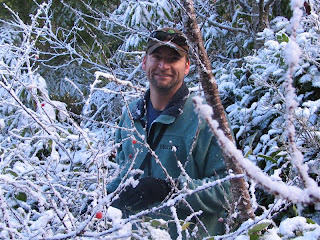Tuesday, December 18, 2007
Advanced undergrad or recent post-undergrad research fellowship at Friday Harbor
"During spring quarter 2008 (March-June), we are teaching at University of Washington's Friday Harbor Laboratories. We seek upper-level undergraduates or post-baccalaureate students to undertake research projects that will form part of the baseline studies prior to removal of dams from the Elwha River. The program will incorporate lectures, experimentation, field trips, and self-directed research. It is an intensive research experience and students receive support for living expenses. The web site for more information is: http://depts.washington.edu/fhl/studentApprentice2008.html"
Applications are due January 10, 2008.
Monday, December 17, 2007
Wednesday, November 28, 2007
Let it snow!

Tuesday, November 20, 2007
I think it is time for my beating...

Monday, October 15, 2007
Of Prizes, Nobel and Ig Nobel
""We face a true planetary emergency," [Gore] said. "The climate crisis is not a political issue, it is a more and spiritual challenge to all of humanity." But Gore is wrong. Climate change absolutely is a political issue, the greatest political issue of our time, and it will only be solved in the political arena, with all the mess and compromise that entails. Environmentalists hate to hear this; they think that global warming is so important it should transcend politics, as the IPCC does, and as Gore himself has in many ways these past seven years. But the final war on global warming will be fought not with PowerPoint but with politics, and it will be fought in the halls of power around the world."
Too many times, we scientists think that research and facts will provide change; time and time again, they merely provide the opening salvos. Scientists who care about this world and the people and places that make it wonderful should spend more time communicating to public audiences--as Gore and the IPCC have--about the issues we study.
We humans have a long, long way to go on the issue of climate change, but I am happy to see it finally on the world's stage--if not center, at least out of the wings...
...
If all this talk of climate change leaves you feeling, ummm, indifferent, well, check out this site, on a guy who actually built a periodic table. Plus, I think getting the Ig Nobel Prize is probably more fun, overall. :-) Be sure to read why he did all this, too--it's a great story.
Monday, October 8, 2007
Are Salmon done for in the Lower 48?
Lackey argues that while many efforts have been made to restore runs of wild salmon in the Pacific Northwest, "few have shown much success. " He points out that:
"Society’s failure to restore wild salmon is a policy conundrum characterized by: (1) claims by a strong majority to be supportive of restoring wild salmon runs; (2) competing societal priorities which are at least partially mutually exclusive; (3) the region’s rapidly growing human population and its pressure on all natural resources (including salmon and their habitats); (4) entrenched policy stances in the salmon restoration debate, usually supported by established bureaucracies; (5) society’s expectation that experts should be able to solve the salmon problem by using a technological scheme and without massive cultural or economic sacrifices (e.g., life style changes); (6) use of experts and scientific “facts” by political proponents to bolster their policy positions; (7) inability of salmon scientists to avoid being placed in particular policy or political camps; and (8) confusion in discussing policy options caused by couching policy preferences in scientific terms or imperatives rather than value-based criteria."
He continues by suggesting that "Given the appreciable costs and social dislocation, coupled with the dubious probability of success, candid public dialog is warranted to decide whether restoration of wild salmon is an appropriate, much less feasible, public policy objective."
He closes with this assessment of the overall policy picture, as he sees it:
"It may appear that political institutions are unable to act, but, in fact, decisions are made daily by institutions (and individuals) on the relative importance of maintaining or restoring wild salmon compared to competing societal priorities. Although few people appear to be happy with the present situation and a strong majority publicly professes support for maintaining wild salmon, there is little indication that society is inclined to confront the root agents of decline (Black, 1995). Those causes deal with both individual life style and sheer numbers of people. Thus, it is likely that society will continue to chase the illusion that wild salmon runs can be restored without massive changes in the number, lifestyle, and philosophy of the human occupants of the western United States and Canada."
Lackey calls this view realistic, neither optimist nor pessimistic... After skimming his main points, I am now going back to read the (73 page) argument a little more carefully... because he might just have a very good point.
Friday, October 5, 2007
I can't wait to see THIS on campus...

Thursday, September 27, 2007
Science education like it oughta be
 While Kroll's advice was aimed primarily at graduate programs, it should be true for an science education program aimed at creating the natural resource professionals of the future, both inside and outside academe. Science education that simply provides "content" to the students should start getting formal audits from teams of professional scientists, and the results of the audits should be presented far and wide. Many of us who work with science professionals already know that there is an informal word of mouth reputation of various programs' graduates; I am suggesting we formalize this. The students will then be better served by their education--becoming both knowledgeable and employable.
While Kroll's advice was aimed primarily at graduate programs, it should be true for an science education program aimed at creating the natural resource professionals of the future, both inside and outside academe. Science education that simply provides "content" to the students should start getting formal audits from teams of professional scientists, and the results of the audits should be presented far and wide. Many of us who work with science professionals already know that there is an informal word of mouth reputation of various programs' graduates; I am suggesting we formalize this. The students will then be better served by their education--becoming both knowledgeable and employable.I used to direct a wildlife management area north of Dallas, TX, and I often hired interns from the local colleges and universities. I found out quickly that the "farm kids" did better than the academic ones, even the graduate biology students. Too many students had plenty of "book learnin'" but not much skill or experience, and it took a considerable amount of time to get them comfortable applying their knowledge. Too many natural resource science professors have no real experience in the field, and pass that inexperience on to their students. It is past time that stopped--we can't keep teaching the way we were (sometimes poorly) taught if we are to remain relevant, in both education and in professional science. (No doubt I'll have to riff on that further in another post. Stay tuned.)
That being said, I know many (too many!) professional scientists who have no real idea how to use statistical analysis or mathematical models correctly. (To wit: a wonderful commentary in Psychological Science titled Editors can lead researchers to confidence intervals, but can't make them think: statistical reform lessons from medicine came out a couple of years back, with the same authors pointing out the same issues--albeit with a less-controversial title--inherent in conservation science a couple of years later in Conservation Biology.)
Really, we need both knowledge and skills to be effective professionals; too much of either leaves one stunted.
I'm happy to say I've been part of an effort to systematically integrate skills and knowledge throughout the undergraduate life sciences at Peninsula College and Western Washington University's Huxley-Peninsula program. Among other things, we host a Research Experiences for Undergraduates program (thank you, National Science Foundation!) that allows our students to work on the world's largest dam removal and fisheries restoration project, the Elwha Ecosystem Restoration Project.
This blog will detail some of the experiences of our program's efforts to provide a real educational experience for our students, as well as my various rants, raves, and commentary on science in this crazy country (which I happen to love dearly, in spite of its recent widely-seen separation with reality) and around the world...
You can also see what the students themselves think: www.protopage.com/elwhareu will keep an rss-feed compilation of all of their blogs--enjoy!